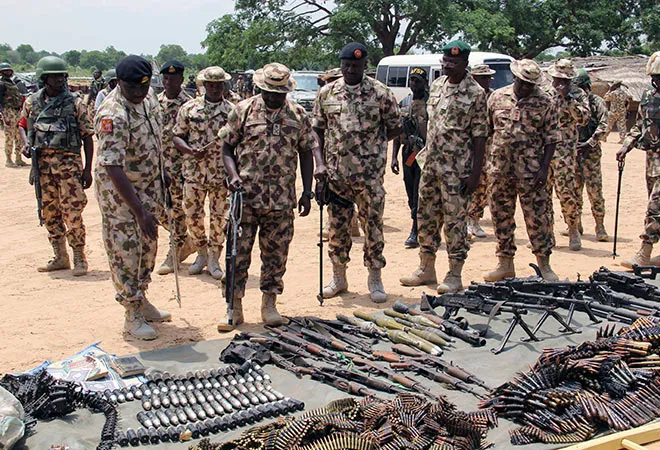-
CENTRES
Progammes & Centres
Location
The spillover of terrorist activity from West Asia to Africa has had devastating consequences for the continent
 The burgeoning of terrorism in Africa has been incontestably connected to the developments in Afghanistan in particular, and west Asia in general, for the past few decades. This is especially so after the seizure of power by the Taliban in Afghanistan with Pakistan’s support on 15 August 2021; the Afghanistan-Pakistan region has a dangerous potential to be a powerful hub of terrorist organisations. Indeed, the Taliban regime during its last tenure (1996-2001) had provided a sanctuary to multinational terrorist outfits such as Al Qaeda led by Osama Bin Laden. In its turn, the deadly terrorist assault of Al Qaeda had brought down the twin towers in New York on 9/11. Moreover, terrorists could establish a state for themselves, albeit for a short while, through the Islamic State (IS) in parts of Iraq and Syria in 2014. The IS, which had stemmed from the remnants of Al Qaeda, eventually got dismantled by 2019 owing to persistent assaults from the US-led coalition against terrorism. As the Al Qaeda as well as the IS began to lose ground in the west Asian region, the foot soldiers as well as the ideologues of these Islamist groupings began to find spaces in Africa to carry forward their activities. This led to a continued surge of violence against civilians by the terrorist groups in states such as Mali, Nigeria, Somalia and Mozambique. For instance, in Africa, in 2015, there were 381 terrorist attacks targeting civilians with 1394 fatalities, while in 2020, there were 7,108 attacks with 12,519 fatalities.
The burgeoning of terrorism in Africa has been incontestably connected to the developments in Afghanistan in particular, and west Asia in general, for the past few decades. This is especially so after the seizure of power by the Taliban in Afghanistan with Pakistan’s support on 15 August 2021; the Afghanistan-Pakistan region has a dangerous potential to be a powerful hub of terrorist organisations. Indeed, the Taliban regime during its last tenure (1996-2001) had provided a sanctuary to multinational terrorist outfits such as Al Qaeda led by Osama Bin Laden. In its turn, the deadly terrorist assault of Al Qaeda had brought down the twin towers in New York on 9/11. Moreover, terrorists could establish a state for themselves, albeit for a short while, through the Islamic State (IS) in parts of Iraq and Syria in 2014. The IS, which had stemmed from the remnants of Al Qaeda, eventually got dismantled by 2019 owing to persistent assaults from the US-led coalition against terrorism. As the Al Qaeda as well as the IS began to lose ground in the west Asian region, the foot soldiers as well as the ideologues of these Islamist groupings began to find spaces in Africa to carry forward their activities. This led to a continued surge of violence against civilians by the terrorist groups in states such as Mali, Nigeria, Somalia and Mozambique. For instance, in Africa, in 2015, there were 381 terrorist attacks targeting civilians with 1394 fatalities, while in 2020, there were 7,108 attacks with 12,519 fatalities.
As the Al Qaeda as well as the IS began to lose ground in the west Asian region, the foot soldiers as well as the ideologues of these Islamist groupings began to find spaces in Africa to carry forward their activities.In June 2021, commander of the United States (US) force in Africa, General Stephen Townsend, observed that there is an unabated spread of terrorism Africa. By August 2021, the US secretary of state, Anthony Blinken, announced that the State Department had added five African Jihadis to the list of Specially Designated Global Terrorist (SDGT). Evidently, Africa is plagued by terrorism inspired by radical Islam. Islamic terrorist outfits are primarily anti-western, and they aim to establish society and state on the basis of Sharia laws/tenets of Islam. By now, Jihadi terrorism has become a global phenomenon. Although such terrorist groups target civilians to achieve political objectives, the causes of terrorism vary according to social circumstances. Moreover, the spillover effect of the activities of radicalised fundamentalist Islam from West Asia to Africa, in effect, has bolstered the activities of terrorist outfits such as Boko Haram in west Africa and Al Shabab in east Africa. Keeping the interlinkages of diverse transnational terrorist outfits and their expanding networks in sight, it would be worthwhile to map out the anatomy of terrorism in Africa.
Like in West Asia, the terrorist activities have grown in their scope and complexities during the past two decades in Africa. Indeed, Islam in Africa accommodated all traditions including the Sufi tradition.A bird’s eye view of the map of terrorism in Africa reveals three distinct regions where terrorist activities have been flourishing. To start with, Somalia, a major coastal state of northeast Africa, has been robbed of political stability for decades owing to the infighting between warlords, trends towards secessionism, and recurrent attempts by Al Shabab to seize power through indiscriminate violence. Developments in Somalia have adversely affected other states such as Kenya, the Democratic Republic of the Congo (DRC) as well as Mozambique. The second region to be affected is the Sahel, a politically volatile region involving states such as Mali, Niger and Burkina Faso, has been plagued by terrorist activities. Such activities have had their impact on adjacent states in the region including the Ivory Coast, Togo and Benin. Lastly, the insurgencies have persisted in the Lake Chad region in spite of counter terrorism measures. Particularly Nigeria, Chad, Cameroon and Niger are affected by terrorist activities. In Africa, innumerable Islamist extremist groups are operating at the moment. However, the most prominent terrorist outfits such as Al Shabab, Boko Haram, Al Qaeda in Islamic Maghreb (AQIB) and Ansar Dine are linked to Al Qaeda. The Islamic State of Somalia (ISS) is connected to IS and Mozambique has also witnessed the escalating threat from the IS. The Islamic State of West African Province (ISWAP), a breakaway group from Boko Haram, is growing in influence and power in the region of Lake Chad. Besides, Ansar Dine has emerged as a powerful outfit in Mali while Islamic State in Greater Sahara (ISGS) has risen since 2016 in breadth in Mali, Niger and Burkina Faso. In fact, the lack of political stability and civil war in Libya has added to the rise of terror in the Sahel region. Intrinsically, the phenomenon of terrorism is fairly heterogeneous as terrorist groupings are divided along ethnic, religious and regional lines. Besides, the rivalries between umbrella organisations such as Al Qaeda and IS also play out among their respective affiliates on the African soil.
Politicians and businessmen began to offer protection money to the organisation for survival, which made Boko Haram integral to the politics of Nigeria.To counter terrorism, organisations such as the United Nations (UN) and African Union (AU) as well as some of the major western powers such as the United Kingdom (UK), France and the US have intervened in Africa. So far, the UN’s peace keeping mission, namely the UN Multidimensional Integrated Stabilisation Mission (MINUSMA) in Mali, has not made any notable progress in bringing about social cohesion after the Tuareg rebellion of 2012. Since June 2021, the UK has been trying to focus on counter terror activities in Mali and Somalia through new deployments although the nature of the terrorist threat from Africa to the UK is still unclear. Moreover, to restore stability in Mali, France, an erstwhile colonial power, have carried out two large military operations, namely operation Serval and Burkhane, since 2013 by stationing over 5,000 military troops in the Sahel region. However, it could not succeed beyond the Malian borders. For instance, in June 2021, terrorists killed 160 people at the border village of Burkina Faso and the borders of Niger and Mali continue to be vulnerable to terrorist attacks. In the vast swathes of semi-arid land of the Sahel region, terrorists have been expanding their networks. Keeping in view the heavy cost of the French military presence in June 2021, France decided to end the west African Burkhane operation; and France’s anti-Jihadi force will end by early 2022. Likewise, although the US under the Trump regime (2017-2021) had escalated air strikes against Al Shabab in 2017, the Biden administration has slowed down its anti-terrorist campaign in Somalia in search of a new policy. Currently, the UN-backed African Union Mission in Somalia (UNISOM) with the involvement of 11 African nations has still been struggling to bring about stability in the Somalian polity. To conclude, transnational terrorist outfits such as Al Qaeda and IS that are functioning as non-state actors in international relations have proved resilient. With their diminishing significance in West Asia, they have steadily shifted their activities in Africa. Their essentially Islamic fundamentalist and anti-West stance coupled with intertwined linkages between the terrorist networks in West Asia and Africa have made terrorism a formidable force. While buying arms and ammunition, these groups have relied on unethical means to accumulate funds. The counter terror strategies of organisations such as the UN and the AU as well as the major powers such as the UK, France and the US have proved inadequate to contain terrorism in Africa.
The views expressed above belong to the author(s). ORF research and analyses now available on Telegram! Click here to access our curated content — blogs, longforms and interviews.

Rajen Harshé is a founder and former Vice Chancellor of the Central University of Allahabad Prayagraj and former President of the G.B. Pant Social Science ...
Read More +